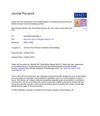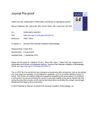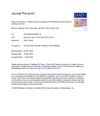 41 citations,
July 2002 in “Clinical and Experimental Dermatology”
41 citations,
July 2002 in “Clinical and Experimental Dermatology” Effective hair loss assessment requires a mix of precise measurement methods.
 11 citations,
April 2020 in “Journal of The American Academy of Dermatology”
11 citations,
April 2020 in “Journal of The American Academy of Dermatology” Microinflammation is more intense in smaller hair follicles and may be linked to hair loss.
 7 citations,
September 2019 in “Journal of The American Academy of Dermatology”
7 citations,
September 2019 in “Journal of The American Academy of Dermatology” Inflammation and fibrosis are not significantly different in pattern hair loss compared to controls.
 1 citations,
May 2020 in “Journal of The American Academy of Dermatology”
1 citations,
May 2020 in “Journal of The American Academy of Dermatology” The authors agree more research with proper control groups is needed to understand hair loss.
 1 citations,
November 2022 in “Journal of The American Academy of Dermatology”
1 citations,
November 2022 in “Journal of The American Academy of Dermatology” Combining scalp photos with hair density and caliber measurements gives a more accurate assessment of hair loss.

The document concludes that diagnosing female hair loss requires careful examination, with treatments varying by condition and psychological support often necessary.
 6 citations,
March 2016 in “British Journal of Dermatology”
6 citations,
March 2016 in “British Journal of Dermatology” Low IGF-1 and high HDL cholesterol levels are linked to more hair loss in middle-aged women.
 3 citations,
October 1982 in “Postgraduate Medicine”
3 citations,
October 1982 in “Postgraduate Medicine” Most types of hair loss can regrow naturally, but there are no effective cures for male pattern or age-related hair loss, and only limited options for females.
 16 citations,
February 2017 in “Dermatology and Therapy”
16 citations,
February 2017 in “Dermatology and Therapy” The new visual scale is a quick and effective way to measure hair loss in women.
 11 citations,
February 2011 in “Current Zoology”
11 citations,
February 2011 in “Current Zoology” About 20% of Japanese macaques had head alopecia, and stress and environment might cause hair loss.
 January 2017 in “Clinical approaches and procedures in cosmetic dermatology”
January 2017 in “Clinical approaches and procedures in cosmetic dermatology” Cosmetic procedures can harm hair, but damage can be minimized with knowledge and care; however, once hair is damaged, it cannot be reliably repaired.
 8 citations,
January 2022 in “Sensors”
8 citations,
January 2022 in “Sensors” Deep learning can accurately automate hair density measurement, with YOLOv4 performing best.
 August 2023 in “Psychology, Health & Medicine”
August 2023 in “Psychology, Health & Medicine” Hair loss (androgenetic alopecia) mildly to moderately affects men's quality of life but not significantly their mental health.
April 2023 in “Journal of Investigative Dermatology” The MDhair app accurately assesses hair loss severity with 94% accuracy.
1 citations,
August 2023 in “Animals” Chimp Haven uses a special system to check and improve the well-being of their chimpanzees, which could help other animal sanctuaries too.
15 citations,
July 2021 in “JAMA Dermatology” Androgenetic alopecia negatively affects quality of life and self-esteem, especially in women, but not depression.
 9 citations,
January 2017 in “Journal of the Egyptian Women's Dermatologic Society (Print)”
9 citations,
January 2017 in “Journal of the Egyptian Women's Dermatologic Society (Print)” Fungal infection was the main cause of hair loss in Egyptian children studied.
 28 citations,
October 2007 in “PubMed”
28 citations,
October 2007 in “PubMed” Low iron levels are linked to more hair loss in non-menopausal women.
 1 citations,
January 2015 in “Hair therapy & transplantation”
1 citations,
January 2015 in “Hair therapy & transplantation” Some supplements and hormones can increase hair loss by raising DHT levels.
 49 citations,
January 2004 in “Dermatology”
49 citations,
January 2004 in “Dermatology” Men with a family history of hair loss are more likely to experience it themselves, especially if both parents have hair loss.
 1 citations,
January 2023 in “Journal of Clinical Medicine”
1 citations,
January 2023 in “Journal of Clinical Medicine” A new hair restoration technology was found to effectively increase hair thickness, density, and growth, while reducing hair loss and improving scalp health, with no side effects.
 November 2024 in “Journal of Cosmetic Dermatology”
November 2024 in “Journal of Cosmetic Dermatology” The hair serum reduced hair loss and improved hair quality in women.
 May 2024 in “Journal of cosmetic dermatology”
May 2024 in “Journal of cosmetic dermatology” A shampoo with caffeine and adenosine may help prevent hair loss and thicken hair.
 July 2012 in “Hair transplant forum international”
July 2012 in “Hair transplant forum international” Hair transplant improved self-perception in hair loss patients, but some still remained overly focused on their hair appearance.
October 2022 in “Reproductive health of woman” Accurate diagnosis and personalized treatment are crucial for managing women's hair loss.
 61 citations,
April 2012 in “British Journal of Dermatology”
61 citations,
April 2012 in “British Journal of Dermatology” Caucasian women's hair appears thickest in their 20s, with perceived thinning after mid-30s due to both decreasing density and diameter.
 27 citations,
December 2005 in “Journal of Cosmetic Dermatology”
27 citations,
December 2005 in “Journal of Cosmetic Dermatology” Niacin derivatives may increase hair fullness in women with hair loss.
 8 citations,
October 2020 in “Lasers in Medical Science”
8 citations,
October 2020 in “Lasers in Medical Science” LLLT helps treat hair loss by increasing blood flow, reducing inflammation, and stimulating growth factors.
 March 2012 in “EFSA Journal”
March 2012 in “EFSA Journal” Iron intake has not been proven to maintain normal hair growth.
 581 citations,
October 1998 in “Journal of The American Academy of Dermatology”
581 citations,
October 1998 in “Journal of The American Academy of Dermatology” Finasteride safely and effectively treats male pattern hair loss, but may cause reversible sexual issues and harm male fetuses.


























